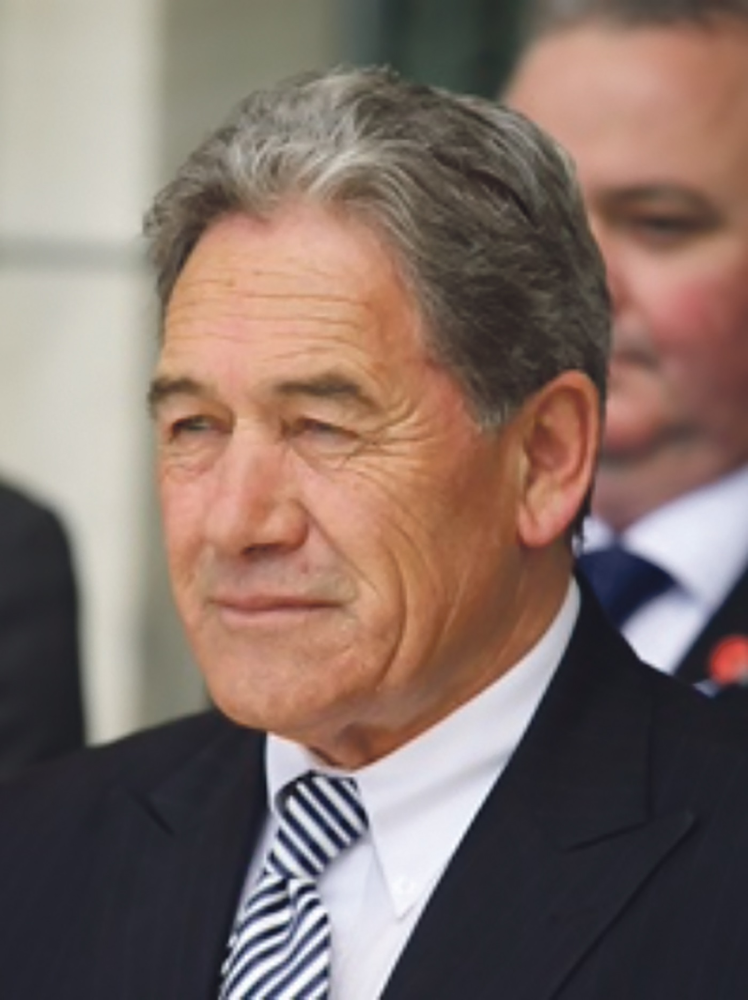
By Bruce Kohn, in Wellington
The 46-year career of Winston Peters in New Zealand politics is reaching a peak, coincidentally at a time when his experience in dealing with the twists and turns of political currents at national and global levels is of high value to the government.
 Never mind the ups and downs of relations between parties represented in Parliament, the accumulated political knowledge of the NZ First leader makes him a figure of exceptional significance in dealing with the administration of the new American president.
Never mind the ups and downs of relations between parties represented in Parliament, the accumulated political knowledge of the NZ First leader makes him a figure of exceptional significance in dealing with the administration of the new American president.
Not since Murray McCully as foreign minister for nine years in the Key administration from 2008 has New Zealand had a foreign minister as experienced and well versed in the ways of diplomacy and global politics. He has already put his stamp on dealings with Washington through installation as ambassador in the US capital of former career diplomat Rosemary Banks.
With experience as the country’s ambassador to France and the United Nations, she came to Washington during Peters’ spell as foreign minister in the Ardern government. That she had known Trump’s national security adviser John Bolton when he was America’s representative at the United Nations was a plus. After leaving the post she took on the role of chair of the NZ-US Council until again shoulder-tapped by the new minister.
This means the country is served by a foreign minister and senior envoy who work well together, have considerable experience of jointly co-operating on complex issues in the US and understand from prior engagements the factors influencing political players in the Washington environment.
Washington insiders believe a dominant factor will be recognition that the administration will be a transactional one based around personal interests of the president. They expect few agreements will be binding should there be a change in the conditions under which they were made. Dealings with Washington are likely to be mercurial, with unexpected shifts and re-balancing of approaches,
This is an atmosphere for which the Peters-Banks relationship is well suited; the politician accustomed to switching approach according to frequently changing circumstances and the diplomat seasoned in the art of “keep cool” and act according to considered assessment.
Immediate issues likely to be on the agenda for New Zealand in the US capital are the new president’s plans for raising tariffs on imported products and decisions the administration might take on backing, or not, disputes abroad that involve America’s billionaire IT moguls.
The claim has often been made that the US has grown into a plutocracy, with the wealthy dictating the courses of government. The willingness of President Trump to include these IT rich listers among his advisers suggests the claim is becoming indisputable.
Especially concerning are fears that the US will use its global power to support the IT sector in disputes with foreign governments. For example, Elon Musk, of social media and space industry fame, tweeted recently that President Trump was due to take office “just in time, thank goodness” and referenced Britain’s Online Safety Act that will take effect in March.
England, along with many other western governments, including our own, is lining up action to impact American-owned IT companies. Intentions are to achieve a curb on inappropriate social media or obtain compensation for use of media content.
Engagement by the White House in bilateral retribution tactics, such as the imposition of special penalties on imports or intellectual property, would swiftly provoke resentment and seed anti-American hostility.
New Zealand has little clear wiggle room in respect of transactional “access for access” dealing with the US on product trade tariffs. Its defence spending levels as a percentage of GDP fit well below what President Trump has called for from European powers. And the opposition of Labour, the Greens, and Te Pati Māori toward New Zealand linkage to the Aukus defence pact are on the record in Washington. The “duck, weave and persuade” powers of the Peters-Banks combo seem likely to be well tested.
A further public influencing task confronting the foreign minister is the inclination of the three individual parties of the ruling coalition to sign up for involvement in security intelligence and consultative defence exchanges under the Aukus security arrangement. They see this security alliance embracing the UK, Australia, and the US as complementary to the North Atlantic Treaty Organisation (Nato) and as a lynchpin of New Zealand’s security.
But with the opposition parties opposed to such a move, the attitude of voters will be carefully assessed before a membership decision is made. The extent to which the public is negatively influenced by the presence of Trump in the White House is relevant.
Peters will need to ensure security issues are well canvassed, but also that there is wide acceptance Trump’s time in the Oval Office is transitional; that security issues will remain whether Trump is in the White House, or not.
The maintenance of a productive China-New Zealand relationship is also on the list of issues Peters must deal with. Put together they demonstrate that political, diplomatic, and first-class relationship building skills are attributes that are prerequisites for the job.
Almost five decades of experience in the political and diplomatic environment at home and abroad suggests Peters might be the right man in the right place at the right time.

Bruce has been an economics and business editor, political and foreign correspondent in Washington, London and Hong Kong. He recently retired as CEO of the Building Industry Federation.



